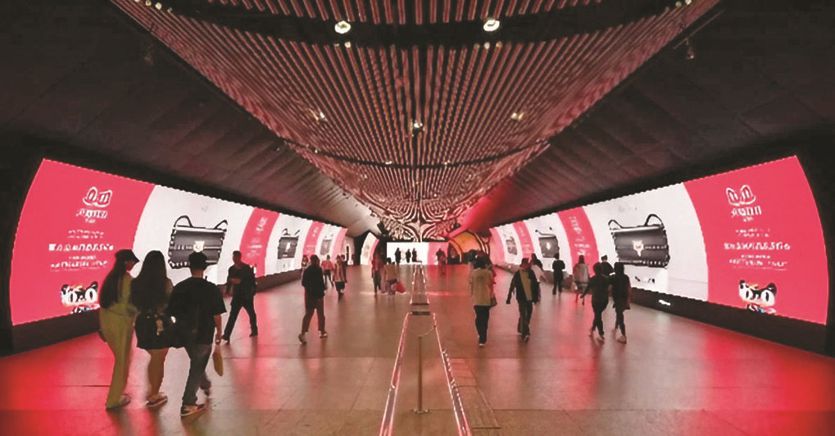Listen to the audio version of the article
After the Golden Week in October – which marked a recovery in Chinese travel abroad and spending – China is warming up its engines for what is in all respects and for more than 10 years the main shopping opportunity for citizens of the People’s Republic: Singles’ Day (also called Double Eleven or 11.11) falls on November 11th and is a date which – being a succession of one – symbolizes the “singleness” that Chinese people should celebrate by shopping.
The record festival
It is a purely commercial celebration, institutionalized by Alibaba in 2009, and it is the largest shopping event in the world: in 2022 according to Syntun, a company that analyzes online sales, Singles’ Day sales have for the first time surpassed the barrier of one trillion Rmb, and therefore approximately 140 billion dollars at the exchange rate at the time. The Double Eleven haul, however, in 2022 had marked the lowest growth (+13%) ever recorded compared to the previous edition: probably a sign of consumer stress (at the time in the midst of yet another lockdown) and of a progressive normalization of consumption growth levels in China.
The strategy of luxury brands
This year the event started well in advance: Jd.com launched promotions on 800 million products available for 30 days on October 23rd (therefore a decidedly extended version of Singles’ day); Alibaba Group launched a 19-day campaign on October 24 with 1 million brands and retailers participating. With a series of new brands (Gucci debuts at the 11.11 Tmall Festival), products and services that, especially in fashion and luxury, can make the difference. And they have already achieved some positive results: «The performance of Tmall Luxury Pavilion during the “extended” 11.11 brought new confidence to the industry: within the first hours of sales, on October 31st, the number of consumers who they rushed to the Pavilion to buy was 1.5 times higher than last year. After 8 p.m., in just one hour, sales of more than 20 luxury brands, including Gucci, Burberry, Ralph Lauren, Valentino, Versace, Montblanc and Rimowa, exceeded the share of sales made in one day last year – Janet Wang, head of Tmall Luxury Pavilion, Alibaba Taobao & Tmall Group, confirms to Il Sole 24 Ore –. After the pandemic, the impact of digitalisation on consumer purchases has increased and, regardless of whether they then purchase directly online, 85% of Chinese decide based on the content they find on digital platforms.” Content which, in the case of the Double Eleven of the Luxury Pavilion, ranges from exclusive products to the personalization of gifts: «This year, around 20 luxury brands have implemented a one-to-one streaming sales service; more than 110 brands, including Gucci and Prada, have launched a customization service on more than 100 thousand products”, adds Wang. Artificial intelligence will also be a major protagonist of this edition: «On 7 November the products of three luxury brands will be presented through the Miaoya Camera, a very popular AI application in China – concludes the analyst -. Consumers will have the opportunity to get photos of themselves wearing the products by creating digital avatars.”
Expectations for 2023
Singles’ day, as the manager of Tmall herself says, is the “greatest opportunity for certain growth” and analysts confirm that it will gather consensus again this year, even in the midst of a normalization process, after having archived the rhythms of pre-pandemic growth. «We don’t expect a change in Chinese consumer sentiment on the Double Eleven – Carole Madjo, head of European Luxury Goods Research at Barclays, explained to the Sole 24 Ore – but we expect a bit of pressure on this event too». In general, China experienced the entire year under pressure: the slowdown in the GDP growth (which should also hit the government target of +5%) in the second half of the year, combined with the real estate crisis, affected the post-Covid rebound. «The Chinese market is moving towards a progressive normalization – continues Carole Madjo –, linked to the fact that the Chinese have undergone a change: they enter shops less, they travel more. The effects are seen above all on less well-off consumer groups: we believe that the willingness to purchase luxury goods on the part of consumers belonging to the middle class (and the lowest spending bracket) has weakened since the beginning of the year, while the rest of consumers have proven resilient. Now we are also seeing wealthier consumers (who spend between 5 thousand and 50 thousand euros on luxury goods), such as lawyers and bankers, becoming more cautious in their spending.”
The change underway
The Barclays analyst, while confirming some factors of change including “an increase in patriotism over recent years” (confirmed by the offer of brands for 11.11 on Tmall, with limited editions of products marked with the dragon, symbol of China) and a “desire to invest in experiences rather than products”, he believes that “since there is no real alternative to Western luxury brands”, they remain at the top of the wish lists of the Chinese. Who are returning to the Old Continent to purchase them: “The majority of luxury customers want to start traveling across the border again and if they can they return to Europe.” For this reason, Madjo concludes, “Chinese spending abroad will drive the value of luxury purchases linked to China, while the domestic market will record limited growth”.
